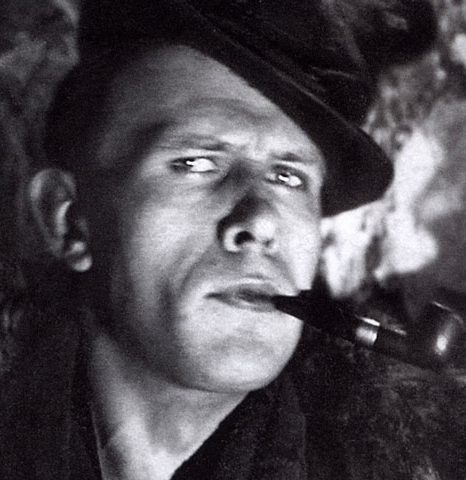DANIIL KHARMS: FOUR POEMS
–Translated from the Russian by Katie Farris and Ilya Kaminsky
SYMPHONY NO. 2
Anton Mikhailovich spat, said “yuck,” spat again, said “yuck” again, spat again, said “yuck” again, and closed the door. To hell with him. Let me tell about Ilya Pavlovich.
Ilya Pavlovich was born in 1893 in Constantinople. When he was still a small boy, his folks moved to Petersburg, he graduated from the German School on Kirchnaya Street. Then he worked in some shop; then he did some other thing; and during the Revolution, he emigrated. To Hell with him. Let me tell about Anna Ignatievna.
Not so easy to talk about Anna Ignatievna. Firstly, I know nothing about her, and secondly, I have just fallen off my chair, and have forgotten what I was about to tell you. So let me tell you about myself.
I am tall, not unintelligent; I dress prudently and with taste; I don’t drink, I don’t bet on horses, but I do like ladies. And ladies don’t avoid me. They smile when I go out with them. Serafima Izmaylovna has been asking me to her place, and Zinaida Yakovlevna implied she would have liked to see me. Then there is a funny business with Marina Petrovna, which I would like you to consider. Quite an ordinary thing, but a funny business still. Because of me, Marina Petrovna turned completely bald – bald like a baby’s bottom. It happened like this: I went over to visit Marina Petrovna, and bang! she lost all her hair. And that was that.
A FAIRYTALE
There once was a man by the name of Semyonov.
And Semyonov went out for a walk and lost his handkerchief.
And Semyonov started looking for a handkerchief and lost his hat.
And looking for a hat, he lost his jacket.
He began to look for a jacket and lost boots.
– Yes – said Semyonov – this is a loss – I shall go home.
Semyonov began walking home – and he got lost.
– No – said Semyonov – I’d rather sit. And he sat down.
And he sat on a stone, and fell asleep.
From NORTHERN TALES
The old man did not know why he went to the woods. Then, he came back from the woods and yelled:
– The old woman! The old woman!
The old woman fell down. Since then, all rabbits in winter are white.
BLUE NOTEBOOK NO. 2
Once there lived a redheaded man without eyes and without ears. And he did not have hair, so
they called him redheaded just so they could have something to say.
He didn’t speak, because he had no mouth. He had no nose either.
He didn’t have any arms or legs. He had no stomach, he had no
back, he had no spine, and he had no intestines of any kind. He didn’t have anything. So we don’t know who it is we keep speaking about.
Thus it’s best that we don’t talk about him any more.
DANIIL KHARMS (1905–1942) was born Daniil Yuvachev in St Petersburg, to an aristocratic mother and a father who had been a member of the violent populist organisation Narodnaya Volya (People’s Will). A surrealist and absurdist poet, prose writer and dramatist, Kharms was educated in part at the elite Peterschule, where instruction was in German. Kharms was also fluent in English. The pseudonym he adopted in 1924 echoes the Cyrillic transcription of Sherlock Holmes’s surname.
About the Translators:
ILYA KAMINSKY was born in Odessa, former Soviet Union in 1977, and arrived to the United States in 1993, when his family was granted asylum by the American government. He is the author of Dancing In Odessa (Tupelo Press, 2004) which won the Whiting Writer’s Award, the American Academy of Arts and Letters’ Metcalf Award, the Dorset Prize, the Ruth Lilly Fellowship given annually by Poetry magazine. Dancing In Odessa was also named Best Poetry Book of the Year 2004 by ForeWord Magazine. In 2008, Kaminsky was awarded Lannan Foundation’s Literary Fellowship.
KATIE FARRIS has taught at UC Berkeley and Brown University and has served as a Visiting Professor at New England College’s MFA Program. She currently teaches fiction, poetry, and comparative literature at San Diego State University. Her fiction, translations, and poetry have appeared or are forthcoming in Virginia Quarterly Review, Verse, Indiana Review, Mid-American Review, Green Mountains Review, Washington Square, Hayden’s Ferry Review, The Brooklyn Rail and other publications.
